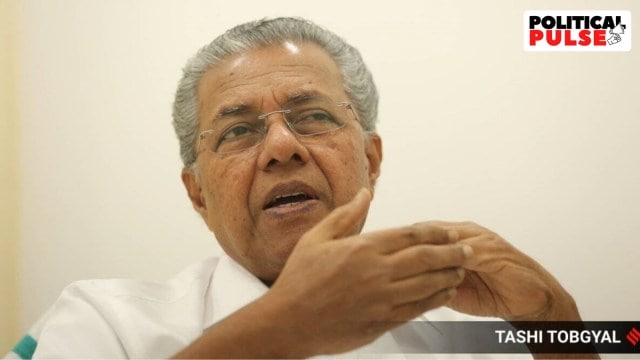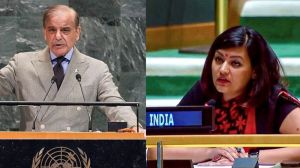Why Congress, CPI(M) have softened their anti-Waqf stand in Kerala
Despite strongly opposing amended Waqf law at the national level, both CPI(M), Cong have refrained from holding any protests against it in Kerala as they do not want to “alienate” their Hindu, Christian bases
 Last week, while replying to a question at a press conference on whether the Waqf Amendment Act will be operationalised in the state, Chief Minister and CPI(M) leader Pinarayi Vijayan said that the “legal aspects” of the Act will “have to be examined’’.
Last week, while replying to a question at a press conference on whether the Waqf Amendment Act will be operationalised in the state, Chief Minister and CPI(M) leader Pinarayi Vijayan said that the “legal aspects” of the Act will “have to be examined’’.
While the CPI(M) and the Congress have been vocal in their opposition to the Waqf Amendment Act at the national level, they have been muted in their campaign over the row in Kerala.
This is in contrast to the aggressive stand the two parties had taken against the Citizenship Amendment Act (CAA) in the wake of its enactment in 2019 and even after the notification of the CAA rules last year.
The Indian Union Muslim League (IUML) and the Indian National League, which are allies of the Congress and the CPI(M) respectively, are the only parties in Kerala that have publicly held rallies against the amended Waqf law.
Last week, while replying to a question at a press conference on whether the Waqf Amendment Act will be operationalised in the state, Chief Minister and CPI(M) leader Pinarayi Vijayan said that the “legal aspects” of the Act will “have to be examined’’.
T P Ramakrishnan, the CPI(M) central committee member and convener of the ruling Left Democratic Front, echoed Vijayan’s stance.
The Supreme Court is currently hearing several petitions against the new Waqf law. After the top court flagged certain aspects of the law, the Centre has said it would neither make any appointments to Waqf Boards nor change the character of Waqfs, including “Waqf-by-user” that are notified and registered as such, until the next hearing on May 5.
Underlining that the party’s stand on Waqf was “very clear”, Ramakrishnan said: “We do not agree with the Waqf amendments. The right of Muslims over Waqf properties cannot be questioned,” he said, adding: “It is a complex legal issue”.
On whether there would be any protests or campaigns against the new Waqf law in Kerala, Ramakrishnan said, “A decision will be taken only after seeing how the situation (on the issue) is evolving”.
“We have a government in Kerala and a decision has to be taken after considering various factors. The RSS agenda is for polarisation. The CPI(M) as well as its government do not want to further that agenda,’’ said Ramakrishnan.
Congress MP Mohammad Jawed is among the petitioners in the apex court, who have challenged the Waqf Amendment Act. The party’s whip in the Lok Sabha, Jawed said the legislation “imposes arbitrary restrictions on Waqf properties and their management, thereby undermining the religious autonomy of the Muslim community”. The Congress MPs had strongly opposed the Act in both Houses of Parliament.
Kerala Pradesh Congress Committee general secretary M Liju said the party’s Political Affairs Committee “will decide on programmes to expose the BJP on the Waqf issue”. But so far, the Congress has not organised any protest or event against the amended Waqf law in Kerala.
One reason why the CPI(M) and the Congress seem to be treading carefully on the issue is how a Waqf property dispute has flared up in the state. The Kerala State Waqf Board has long staked claim over 404 acres of land in Ernakulam district’s Munambam, which has been inhabited for generations by some 600 Christian and Hindu families.
The Kerala government has set up a judicial commission to find a permane
While the CPI(M) and the Congress have been vocal in their opposition to the Waqf Amendment Act at the national level, they have been muted in their campaign over the row in Kerala.
This is in contrast to the aggressive stand the two parties had taken against the Citizenship Amendment Act (CAA) in the wake of its enactment in 2019 and even after the notification of the CAA rules last year.
The Indian Union Muslim League (IUML) and the Indian National League, which are allies of the Congress and the CPI(M) respectively, are the only parties in Kerala that have publicly held rallies against the amended Waqf law.
Last week, while replying to a question at a press conference on whether the Waqf Amendment Act will be operationalised in the state, Chief Minister and CPI(M) leader Pinarayi Vijayan said that the “legal aspects” of the Act will “have to be examined’’.
T P Ramakrishnan, the CPI(M) central committee member and convener of the ruling Left Democratic Front, echoed Vijayan’s stance.
The Supreme Court is currently hearing several petitions against the new Waqf law. After the top court flagged certain aspects of the law, the Centre has said it would neither make any appointments to Waqf Boards nor change the character of Waqfs, including “Waqf-by-user” that are notified and registered as such, until the next hearing on May 5.
Underlining that the party’s stand on Waqf was “very clear”, Ramakrishnan said: “We do not agree with the Waqf amendments. The right of Muslims over Waqf properties cannot be questioned,” he said, adding: “It is a complex legal issue”.
On whether there would be any protests or campaigns against the new Waqf law in Kerala, Ramakrishnan said, “A decision will be taken only after seeing how the situation (on the issue) is evolving”.
“We have a government in Kerala and a decision has to be taken after considering various factors. The RSS agenda is for polarisation. The CPI(M) as well as its government do not want to further that agenda,’’ said Ramakrishnan.
Congress MP Mohammad Jawed is among the petitioners in the apex court, who have challenged the Waqf Amendment Act. The party’s whip in the Lok Sabha, Jawed said the legislation “imposes arbitrary restrictions on Waqf properties and their management, thereby undermining the religious autonomy of the Muslim community”. The Congress MPs had strongly opposed the Act in both Houses of Parliament.
Kerala Pradesh Congress Committee general secretary M Liju said the party’s Political Affairs Committee “will decide on programmes to expose the BJP on the Waqf issue”. But so far, the Congress has not organised any protest or event against the amended Waqf law in Kerala.
One reason why the CPI(M) and the Congress seem to be treading carefully on the issue is how a Waqf property dispute has flared up in the state. The Kerala State Waqf Board has long staked claim over 404 acres of land in Ernakulam district’s Munambam, which has been inhabited for generations by some 600 Christian and Hindu families.
The Kerala government has set up a judicial commission to find a permanent solution in favour of the Munambam residents. There is also an ongoing litigation on the matter in the Kerala High court.
This situation has particularly put the CPI(M) in a dilemma as it does not want to “alienate” its Christian and Hindu bases, especially in the run-up to the Assembly polls slated for early 2026. The Congress seems to share its arch rival’s dilemma on the issue.
Last year, when the CAA rules were notified, the CPI(M) had taken the lead in rallying against the Act. The Kerala government was first in the country to announce that the CAA will not be implemented in the state, and took on the BJP aggressively. It has however not taken a similar position against the new Waqf legislation.West Bengal CM and Trinamool Congress (TMC) supremo Mamata Banerjee has said that her state will not implement it.
The Congress’s Kerala unit, too, had protested against the CAA, organising public protests.
Muslims constitute 26% of Kerala’s population and have traditionally supported the Congress-led United Democratic Front alliance. However, the CPI(M) has been making huge efforts to reach out to the community.
In the 2024 Lok Sabha elections, the Left had tried to woo Muslim voters through the anti-CAA plank but that did not seemed to have worked with the party winning only one seat out of the state’s 20 seats.
nt solution in favour of the Munambam residents. There is also an ongoing litigation on the matter in the Kerala High court.
This situation has particularly put the CPI(M) in a dilemma as it does not want to “alienate” its Christian and Hindu bases, especially in the run-up to the Assembly polls slated for early 2026. The Congress seems to share its arch rival’s dilemma on the issue.
Last year, when the CAA rules were notified, the CPI(M) had taken the lead in rallying against the Act. The Kerala government was first in the country to announce that the CAA will not be implemented in the state, and took on the BJP aggressively. It has however not taken a similar position against the new Waqf legislation.West Bengal CM and Trinamool Congress (TMC) supremo Mamata Banerjee has said that her state will not implement it.
The Congress’s Kerala unit, too, had protested against the CAA, organising public protests.
Muslims constitute 26% of Kerala’s population and have traditionally supported the Congress-led United Democratic Front alliance. However, the CPI(M) has been making huge efforts to reach out to the community.
In the 2024 Lok Sabha elections, the Left had tried to woo Muslim voters through the anti-CAA plank but that did not seemed to have worked with the party winning only one seat out of the state’s 20 seats.





- 01
- 02
- 03
- 04
- 05


























